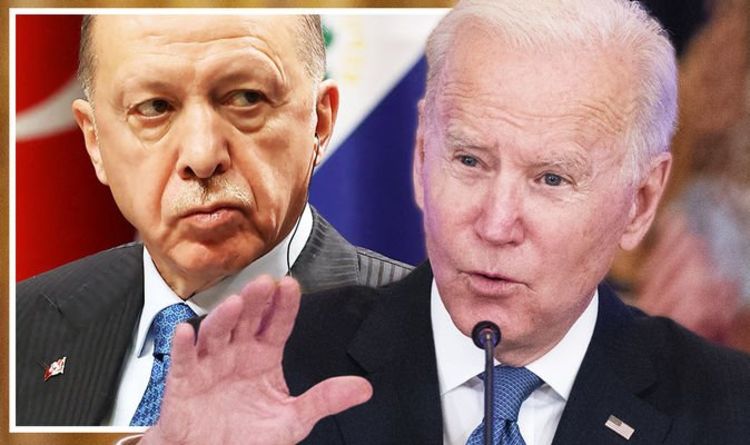Turkey is an ‘increasingly significant power’ within EU says expert
We use your sign-up to provide content in ways you’ve consented to and to improve our understanding of you. This may include adverts from us and 3rd parties based on our understanding. You can unsubscribe at any time. More info
US Representatives Gus Bilirakis and Frank Pallone have called on Joe Biden to reject the request to update and upgrade Turkey’s current fighter jet inventory. In their letter, they claim that under President Erdogan, Turkey has used its military power to destabilize the Eastern Mediterranean, Middle East, South Caucasus, and North Africa.
More specifically, they claim Turkey and Turkish-backed forces “have utilized American-made weaponry and components during these incursions to commit war crimes” and that granting Turkey’s request “will more likely lead to further death and destruction in the region.”
Mr Bilirakis and Mr Pallone also accuse the Erdogan regime of carrying out undemocratic practices and human rights abuses at home.
“Approving this proposal would reward President Erdogan for ignoring both Turkey’s alliance commitments to the United States and the North Atlantic Treaty Organization (NATO) and the vast human rights abuses his regime continues to commit at home and abroad,” they argue.


However, the rejection comes as a potential headache for US-Turkey relations.
As a member of NATO, Turkey enjoys a highly privileged geopolitical position within the alliance, bridging the gap between East and West.
Furthermore, Turkey holds the choke-point in the Black Sea, forcing any Russian naval assets to sail within meters of a NATO members coast.
Rejecting the purchase offer also comes with another problem.
Turkey has not hesitated in the past to send shopping lists elsewhere.
This was demonstrated in the purchase of Russian S-400 missile and air defence batteries.


In 2017, Mr Erdogan brokered a deal reportedly worth $2.5 billion with Russian President Vladimir Putin for the S-400 mobile surface-to-air missile system.
The S-400 system is said to pose a risk to the NATO alliance as well as the F-35, America’s most expensive weapons platform.
Despite warnings from the United States and other NATO allies, Turkey accepted the first of four missile batteries in July 2019. A week later, the United States cut Turkey, a financial and manufacturing partner, from the F-35 program.
Under the Countering America’s Adversaries Through Sanctions Act, which President Donald Trump signed in August 2017, Turkey faced potential economic sanctions for accepting the Kremlin’s missile system.
DON’T MISS:
Dog waits outside home of murdered owner every day [REPORT]
Beer prices poised for huge 50p hike [REVEAL]
Irish fishermen line up to disrupt Russian navy [INSIGHT]

US relations with Turkey take place within a complicated environment featuring several bilateral, regional, and Turkish domestic considerations.
Recent tensions have raised questions about the future of bilateral relations and have led to US actions against Turkey, including sanctions and informal congressional holds on major new arms sales.
Nevertheless, both countries’ officials emphasize the importance of continued US-Turkey cooperation and Turkey’s membership in NATO.
With the country facing significant inflation, Mr Erdogan has pressured Turkey’s central bank to lower interest rates—a response counter to conventional economic theory.

Turkey’s tensions in the Eastern Mediterranean with countries such as the Republic of Cyprus and Greece have impacted its relations with several countries in the region, some of whom (such as the ROC, Greece, Israel, and Egypt) have grown closer as a result.
Some observers have urged the United States to explore alternative basing arrangements for US and NATO military assets in Turkey.
The US is negotiating with Turkish officials over the sale, according to Turkish officials.
A chief adviser to Mr Erdogan, Ibrahim Kalin, inquired about the deal during a call on January 10 with White House national security adviser Jake Sullivan, according to a person familiar with the discussion.
A National Security Council spokesman declined to comment.
A State Department spokesman said: “The United States and Turkey have longstanding and deep bilateral defence ties, and Turkey’s continued NATO interoperability remains a priority.”
Source: Read Full Article





